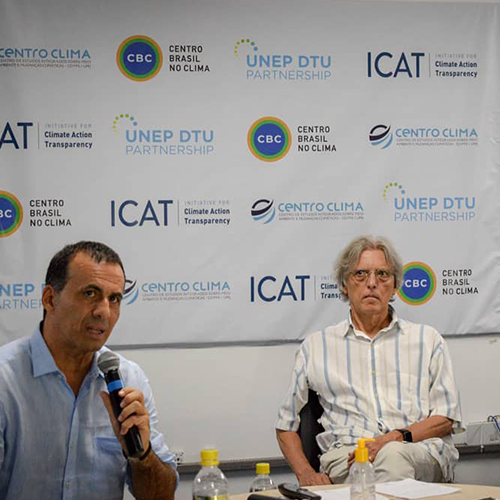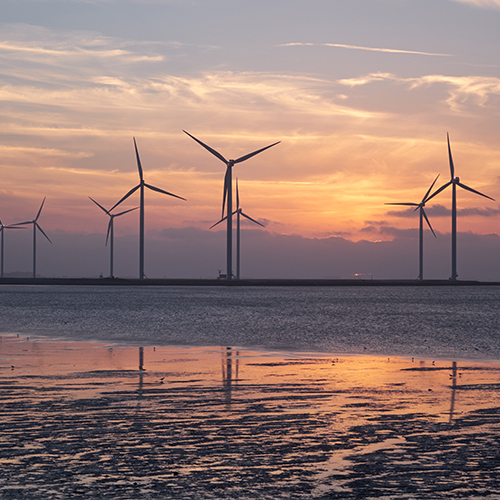Accessibility Tools
 O Fórum Brasileiro de Mudança Climática (FBMC) promoverá, no dia 13 de julho, às 16h, uma conversa sobre o aumento de ambição nos compromissos nacionais junto ao Acordo de Paris. O professor Emilio La Rovere, coordenador do CentroClima e do Laboratório Interdisciplinar de Meio Ambiente (COPPE/UFRJ), é um dos convidados a participar do assunto.
O Fórum Brasileiro de Mudança Climática (FBMC) promoverá, no dia 13 de julho, às 16h, uma conversa sobre o aumento de ambição nos compromissos nacionais junto ao Acordo de Paris. O professor Emilio La Rovere, coordenador do CentroClima e do Laboratório Interdisciplinar de Meio Ambiente (COPPE/UFRJ), é um dos convidados a participar do assunto.
Além do professor, integram a conversa: Eduardo Lunardelli Novaes, Secretário de Relações Internacionais, Ministério do Meio Ambiente; Marina Grossi (CEBDS); José Goldemberg (USP); Carlos Nobre (IEA-USP) e Oswaldo Lucon (FBMC).
As inscrições para participar da reunião devem ser feitas AQUI. Após a inscrição, o participante receberá um e-mail de confirmação contendo informações sobre como entrar na reunião.
 Na semana do Dia Mundial do Meio Ambiente (5 de junho), a Câmara de Comércio França-Brasil (CCI) compartilhou uma série de conteúdos especiais produzida com base na visão de especialistas sobre os desafios e as oportunidades em um período de reflexão e de novos cenários a partir das questões climáticas, sociais e econômicas geradas com os impactos da COVID-19. Confira, abaixo, um resumo sobre as atividades da semana e seus respectivos entrevistados:
Na semana do Dia Mundial do Meio Ambiente (5 de junho), a Câmara de Comércio França-Brasil (CCI) compartilhou uma série de conteúdos especiais produzida com base na visão de especialistas sobre os desafios e as oportunidades em um período de reflexão e de novos cenários a partir das questões climáticas, sociais e econômicas geradas com os impactos da COVID-19. Confira, abaixo, um resumo sobre as atividades da semana e seus respectivos entrevistados:
Como acelerar as grandes transições em prol do Desenvolvimento Sustentável na era pós-COVID?
A primeira entrevista aborda o tema sob o olhar de especialistas do setor energético, atuantes na esfera pública. Thiago Barral, presidente da Empresa de Pesquisa Energética (EPE), e Heloísa Borges Esteves, diretora de Estudos de Petróleo, Gás e Biocombustíveis da instituição, explicaram o papel estratégico da EPE, a visão de cenários no âmbito de retomada e colaboração – especialmente no eixo França-Brasil –, e quais as pautas em curso.
Transição energética, investimentos em tecnologias disruptivas sustentáveis e parcerias estratégicas: quais os desafios e as possíveis ações no pós-COVID?
Em sua fala, Emilio Lèbre La Rovere, coordenador do Laboratório Interdisciplinar de Meio Ambiente e do CentroClima da COPPE/UFRJ, explica o funcionamento e objetivo dos laboratórios que coordena. Em sua fala, o professor também aborda os principais impactos da pandemia da COVID-19 que afetam a agenda dos processos de transição energética, além de indicar os desafios e obstáculos para que essa inovação esteja no topo das prioridades dos planos governamentais, o que relembra a emergência do cumprimento das metas estabelecidadas pelo Acordo de Paris, o qual o Brasil é signatário.
Como redes multidisciplinares e internacionais de estudos em estratégias de desenvolvimento sustentável pensam a era pós-COVID?
Instituições de pesquisa dedicadas à elaboração de propostas e instrumentos de ação ligados aos desafios climáticos são cada vez mais atores-chave de nossa sociedade. A exemplo do CentroClima, seu parceiro francês Institut du Développement Durable et des Relations Internationales (IDDRI) se destaca nessa atuação. Em um ano que estavam previstas medidas mais ousadas do Acordo de Paris, a COVID-19 acrescentou desafios complementares aos da luta pela causa climática global. Diante dessa situação, quais são as oportunidades e alavancas para avançar nas transições climáticas, econômicas e sociais necessárias? Esse foi o tema da entrevista com Yann Briand, pesquisador em políticas de clima-energia-transportes no IDDRI.
Transição energética, agricultura sustentável e inovação: quais as oportunidades e os desafios do Brasil no pós-COVID?
A entrevistada da vez foi Izabella Teixeira, copresidente do Painel de Recursos Naturais da ONU (IRP-Unep), membro do Conselho da Divisão de Assuntos Sociais e Econômicos das Nações Unidas e Senior Fellow do CEBRI. Izabella falou sobre os pontos de interseções de sua atuação nas Nações Unidas e do CEBRI, em seguida, ressaltou os impactos causados na agenda das transições ecológicas pela pandemia do novo coronavírus. Discutiu também sobre parceiras e ações estratégicas que devem ser buscadas e/ou fortalecidas, e qual o potencial de colaborações multilaterais e bilaterais, a exemplo da relação França-Brasil.
Fundada há 120 anos e reunindo mais de 770 associadas, entre empresas francesas e brasileiras, representando os mais diversos setores de atuação, a CCIFB promove o desenvolvimento das relações econômicas, financeiras, comerciais, industriais, científicas e culturais entre a França e o Brasil. Nossas regionais em São Paulo, Rio de Janeiro, Minas Gerais e Paraná, além de uma representação no Rio Grande do Sul, formam uma rede de ação articulada no país, permitindo que nossos associados estabeleçam novas parcerias e desenvolvam novos negócios.
Para mais informações, clique AQUI.
 No dia 18 de março de 2020 aconteceu o workshop NDC e MRV no âmbito estadual, realizado em conjunto pelo Centro Brasil no Clima e o Centro Clima (Coppe/UFRJ). O evento foi organizado com o objetivo de apresentar os resultados da primeira fase do projeto, finalizada em 2019, e as propostas para a segunda fase iniciada em 2020. O foco na etapa atual é a atuação em nível subnacional, buscando promover o engajamento dos estados e identificar oportunidades para o desenvolvimento de ações para que contribuam com a implementação da NDC brasileira, apresentada no âmbito do Acordo de Paris.
No dia 18 de março de 2020 aconteceu o workshop NDC e MRV no âmbito estadual, realizado em conjunto pelo Centro Brasil no Clima e o Centro Clima (Coppe/UFRJ). O evento foi organizado com o objetivo de apresentar os resultados da primeira fase do projeto, finalizada em 2019, e as propostas para a segunda fase iniciada em 2020. O foco na etapa atual é a atuação em nível subnacional, buscando promover o engajamento dos estados e identificar oportunidades para o desenvolvimento de ações para que contribuam com a implementação da NDC brasileira, apresentada no âmbito do Acordo de Paris.
O CBC, com apoio técnico do Centro Clima/Coppe/UFRJ, iniciou em 2018 o projeto ICAT Brazil, financiado pela Initiative for Climate Action Transparency (ICAT), através de uma parceria entre o Programa das Nações Unidas para o Meio Ambiente e a Universidade Técnica da Dinamarca (UNEP DTU Partnership), para estabelecer indicadores de monitoramento para a implementação da NDC brasileira. Os indicadores resultantes do trabalho realizado neste projeto são um passo inicial para a consolidação de um processo robusto e transparente de monitoramento, reporte e verificação (MRV), capaz de avaliar as ações que levarão ao cumprimento das metas de mitigação da NDC brasileira.
Emilio La Rovere, coordenador do Centro Clima e professor da Coppe/UFRJ, apresentou o trabalho desenvolvido na primeira fase do projeto, com a elaboração de três cenários de emissões no horizonte até 2030 e a construção de um sistema de indicadores de monitoramento, reporte e verificação (MRV) para avaliar as ações propostas para a implementação da NDC. Emilio ressaltou a importância do participação das equipes técnicas dos estados: “É importante que as equipes se envolvam e se capacitem com esta metodologia que estamos dispostos a compartilhar para que possamos avançar no sentido de internalizar a dimensão da mudança do clima no trabalho de gestão ambiental dos estados”.
Para saber mais sobre a apresentação do Professor Emilio e das demais participações e conclusões do workshop, clique AQUI e acesse o Sumário Executivo.
 Em comemoração ao Dia Mundial do Meio Ambiente, a Associação Brasileira de Entidades Estaduais do Meio Ambiente (ABEMA) promove o primeiro webinário da série Estratégias dos Estados Brasileiros na Agenda do Clima, que falará sobre Energia Renovável e Setor Produtivo. A fala será conduzida pelo Prof. Emilio La Rovere, coordenador do Centro Clima e professor titular da Coppe/UFRJ, e acontecerá no dia 5 de junho, de 9h às 12h.
Em comemoração ao Dia Mundial do Meio Ambiente, a Associação Brasileira de Entidades Estaduais do Meio Ambiente (ABEMA) promove o primeiro webinário da série Estratégias dos Estados Brasileiros na Agenda do Clima, que falará sobre Energia Renovável e Setor Produtivo. A fala será conduzida pelo Prof. Emilio La Rovere, coordenador do Centro Clima e professor titular da Coppe/UFRJ, e acontecerá no dia 5 de junho, de 9h às 12h.
A pauta da apresentação consiste em uma exposição da visão geral do Acordo de Paris e da NDC brasileira, para abordar questões pertinentes a contribuição dos Estados para o cumprimento dos compromissos do Brasil junto à Convenção do Clima. Para ter um acesso mais detalhado sobre os temas que farão parte do evento, consulte a apresentação do professor Emilio aqui.
O webinar é o primeiro da série promovida pela ABEMA. Participe!
Acesse o webnário AQUI.
 A situação dos que atuam na questão climática no Brasil é difícil. Praticamente não existe mais interlocução com a esfera federal, a não ser de forma discreta com o corpo técnico de alguns ministérios. O tom é dado pelo cinismo e pelo negacionismo, com atentados diários ao meio ambiente e a seus defensores em uma trajetória que é, nitidamente, a do não cumprimento da NDC brasileira e do Acordo de Paris.
A situação dos que atuam na questão climática no Brasil é difícil. Praticamente não existe mais interlocução com a esfera federal, a não ser de forma discreta com o corpo técnico de alguns ministérios. O tom é dado pelo cinismo e pelo negacionismo, com atentados diários ao meio ambiente e a seus defensores em uma trajetória que é, nitidamente, a do não cumprimento da NDC brasileira e do Acordo de Paris.
A situação está sendo enfrentada de diversas maneiras, e há diversos espaços de atuação que permitem reduzir danos a curto prazo e preparar contraofensivas a médio prazo. Para integrar discussão sobre o tema, no dia 18 de março de 2020, de 09:30h às 12:00h, acontecerá a reunião estratégica "Desafios Climáticos em 2020", que será realizada de forma virtual.
O CBC vem mantendo, desde 2015, reuniões estratégicas, às quais são convidadas algumas das pessoas mais destacadas na luta em defesa do clima no Brasil, entre as diversas áreas envolvidas.
Essas reuniões propiciam troca de informação e opiniões sobre a conjuntura nacional e internacional, bem como seus desdobramentos. Além disso, proporcionam análises aprofundadas e ações coordenadas coletivamente.
Para participar, inscreva-se AQUI.
